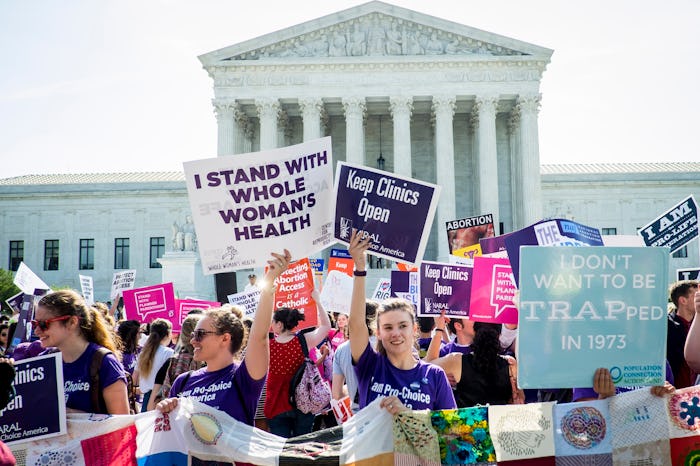
This One Tweet About The SCOTUS Abortion Ruling Is Far Too Important To Ignore
It's been a big day for women's reproductive rights across the country: the Supreme Court of the United States ruled Monday that Texas' restrictive abortion law H.B. 2 would make it unnecessarily difficult for women to access safe, medical abortions in the state, reversing a Fifth Circuit Court of Appeals ruling allowing the law to stand, according to Forbes. This precedent-setting ruling is a huge victory for everyone who has fought against the growing number of anti-abortion laws being passed throughout the country, many of which will now also be considered unconstitutional. Unsurprisingly, social media has been buzzing about the landmark ruling, with people around the world celebrating the victory for everyone who happens to have a uterus. But this one tweet about the SCOTUS abortion ruling is a reminder that, while the ruling is beneficial to all women, it's even more important to marginalized women who are often the ones who have to live with the harshest consequences of laws that try and take away women's rights.
In a total #micdrop moment, CNN political commentator Sally Kohn wrote Monday that she was, "Most thrilled for low-income women in Texas & around nation. Rich women will always have abortion care. All women deserve [the] same choice!"
The socio-economic divide among women has always been an issue when laws like H.B. 2 come into existence — not only do they tend to affect low-income women and women of color more than white women, but they also tend to be passed in areas where women are already at a disadvantage. According to Yes! Magazine, almost 90 percent of counties in the United States did not have an abortion clinic in 2011, and fewer than one in 10 abortion clinics are located in communities where the majority of people are people of color.
Similarly, 75 percent of women who have had abortions have cited economic instability as a major reason for doing it, and the majority of women accessing abortions are non-white women. Yet, the discussion about race and poverty often seems to be left out of the abortion debate, being overshadowed by issues of government regulation, religious rights, and morality. And though women throughout the country work tirelessly to advocate for their reproductive rights and fight the stigma surrounding abortion, most of the protesters seen on TV and the most visible faces behind the movement are white women, and that can make it easy to forget the reality that non-white women face when it comes to accessing abortion services.
For many women, accessing abortion is expensive, time consuming, and in some cases, entirely impossible. According to the Guttmacher Institute, 27 states require pre-abortion counseling and a mandatory waiting period before a woman can have an abortion. Eighteen states require abortions to be performed in a hospital, and 11 states restrict coverage of abortion by private health insurance. A woman seeking an abortion might have to arrange transportation, accommodation if they are required to stay overnight, childcare, and time off from work, in addition the money for the actual procedure — according to Planned Parenthood an in-clinic abortion cost up to $1,500. If you're already struggling financially, or are lacking support, that's going to be even more difficult than it would be in the first place.
And that certainly seems to be the case for many women seeking abortions throughout the United States. According to Yes! Magazine,
Of all women obtaining abortions, 42 percent are living below the federal poverty level of $10,830 for a single woman without children. Another 37 percent live between 100 percent and 199 percent of the federal poverty level.
Thanks to laws like H.B. 2 and others just like it throughout the country, more and more women are left with two grim options: carry an unwanted pregnancy to term, or risk an illegal or self-induced abortion. In fact, according to the University of Texas' Texas Policy Evaluation Projects (TxPEP), it is estimated that more than 100,000 women in Texas have likely had self-induced abortions, due to restrictions like H.B. 2. The good news is that, now that H.B. 2 has been struck down by the Supreme Court, the state's ability to further restrict Texas women's access to safe abortions has been halted. But that doesn't mean that there isn't still a very, very long way to go.
Access to abortion is an important issue that affects everyone who has the ability to get pregnant, but it's also true that it doesn't affect everyone in the same way. For women who are living in poverty, or who are marginalized, access to abortion services becomes even more crucial, as they are more likely to have even fewer choices available to them than more affluent women. While the SCOTUS ruling is a victory for women in general, there's no doubt it's particularly meaningful for those whose lives were being put in danger by H.B. 2 and laws just like it throughout the country.